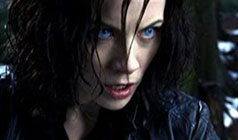|
|
|
|
Underworld: Evolution
|
 |
|
This sequel to Underworld (2003) is pitched, like the Crow movies, to the Goth crowd – and it shares in the frequent humourlessness of
that subculture. The war between werewolves and vampires continues to rage –
indeed, it seems from the open ending of this instalment that it is likely
never to end – and at its centre is Selene (Kate Beckinsale), who this time
around gets a smouldering companion in Michael (Scott Speedman), a hybrid of
vampire and “Lycan” (which, oddly enough, I kept hearing as “Lacan”).
The
narrative of Underworld: Evolution moves in two directions simultaneously. The first direction is relentlessly
forward, in space: everyone always has to get somewhere (in a hurry), and
someone else is always in hot pursuit of them. The second direction is
backward, in time: it seems as if we will never get to the bottom of the
revelations about fathers and brothers, creatures locked away hundreds of years
ago, and the secret alliances and betrayals which continue to have ghastly
repercussions.
Once
you have exhausted the movements on these two axes of evil, Underworld: Evolution has little to
offer. It is a strange, very contemporary object, obviously influenced by video
games (hence the endless chases, labyrinthine passagesways in old castles, and
Selene in tight-fitting leather gear), and by the style of digital design
popular in rock clips and slick advertisements (everything is rendered,
maddeningly, in shades of blue).
Director
Len Wiseman (Beckinsale’s husband from 2004 to 2019), back for the sequel,
handles every scene in an earnest, histrionic, fiddly way: it is the kind of
film in which, if somebody wants their interlocutor to look at something (such
as a book or a medallion), they will hurl it dramatically from the opposite end
of the room, complete with extravagant wind noises. Only Derek Jacobi as
Corvinus is able to lend the appropriately fruity gravitas to this morose
business.
In
one respect alone, the film is intriguing. Audiences have become used to
improbable mind-game movies in which the memories stored in a brain can be
“rewound” and viewed like a strip of film. Underworld:
Evolution goes one better: once the very bad guy Marcus (Tony Curran) sinks
his teeth into a person’s neck, he can see, in super-fast motion and pristine
editing, their entire past experience as coded in their blood!
There
is no message, overt or covert, in Underworld:
Evolution, but it is ultimately a quite conservative film. This is because,
when it comes to the crunch, bullets (preferably several hundred of them) make
for the best weapon; and – even in a world rife with such multiple-species
“evolution” – young, trim, human flesh is the only kind considered suitable for
sex scenes.
© Adrian Martin January 2006 |
![]()